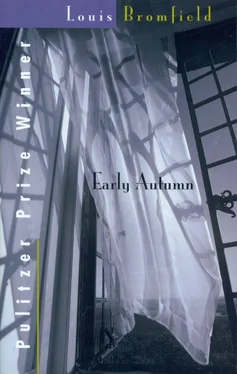Sabine was launched now with all the passion which seized her when she had laid bare a little patch of life and examined it minutely.
“He didn’t even dare to be unfaithful to her. If he looked at another woman she fainted and became deathly ill and made terrible scenes. I can remember some of them. I remember that once he called on Mrs. Soames when she was young and beautiful, and when he came home Aunt Cassie met him in hysterics and told him that if it ever happened again she would go out, ‘frail and miserable as she was,’ and commit adultery. I remember the story because I overheard my father telling it when I was a child and I was miserable until I found out what ‘committing adultery’ meant. In the end she destroyed him. I’m sure of it.”
Sabine sat there, with a face like stone, following with her eyes the cloud dust that moved along the lane as Aunt Cassie progressed on her morning round of visits, a symbol in a way of all the forces that had warped her own existence.
“It’s possible,” murmured Olivia.
Sabine turned toward her with a quick, sudden movement. “That’s why she is always so concerned with the lives of other people. She has never had any life of her own, never. She’s always been afraid. It’s why she loves the calamities of other people, because she’s never had any of her own. Not even her husband’s death was a calamity. It left her free, completely free of troubles as she had always wanted to be.”
And then a strange thing happened to Olivia. It was as if a new Aunt Cassie had been born, as if the old one, so full of tears and easy sympathy who always appeared miraculously when there was a calamity in the neighborhood, the Aunt Cassie who was famous for her good works and her tears and words of religious counsel, had gone down the lane for the last time, never to return again. Tomorrow morning a new Aunt Cassie would arrive, one who outwardly would be the same; only to Olivia she would be different, a woman stripped of all those veils of pretense and emotions with which she wrapped herself, an old woman naked in her ugliness who, Olivia understood in a blinding flash of clarity, was like an insect battering itself against a pane of glass in a futile attempt to enter where it was impossible for her ever to enter. And she was no longer afraid of Aunt Cassie now. She did not even dislike her; she only pitied the old woman because she had missed so much, because she would die without ever having lived. And she must have been young and handsome once, and very amusing. There were still moments when the old lady’s charm and humor and sharp tongue were completely disarming.
Sabine was talking again, in a cold, unrelenting voice. “She lay there all those years on the sofa covered with a shawl, trying to arrange the lives of everyone about her. She killed Anson’s independence and ruined my happiness. She terrorized her husband until in the end he died to escape her. He was a good-natured man, horrified of scenes and scandals.” Sabine lighted a cigarette and flung away the match with a sudden savage gesture. “And now she goes about like an angel of pity, a very brisk angel of pity, a harpy in angel’s clothing. She has played her role well. Everyone believes in her as a frail, good, unhappy woman. Some of the saints must have been very like her. Some of them must have been trying old maids.”
She rose and, winding the chiffon scarf about her throat, opened her yellow parasol, saying, “I know I’m right. She’s a virgin. At least,” she added, “in the technical sense, she’s a virgin. I know nothing about her mind.”
And then, changing abruptly, she said, “Will you go up to Boston with me tomorrow? I’m going to do something about my hair. There’s gray beginning to come into it.”
Olivia did not answer her at once, but when she did speak it was to say, “Yes; I’m going to take up riding again and I want to order clothes. My old ones would look ridiculous now. It’s been years since I was on a horse.”
Sabine looked at her sharply and, looking away again, said, “I’ll stop for you about ten o clock.”
Heat, damp and overwhelming, and thick with the scent of fresh-cut hay and the half-fetid odor of the salt marshes, settled over Durham, reducing all life to a state of tropical relaxation. Even in the mornings when Sybil rode with O’Hara across the meadows, there was no coolness and no dew on the grass. Only Aunt Cassie, thin and wiry, and Anson, guided perpetually by a sense of duty which took no reckoning of such things as weather, resisted the muggy warmth. Aunt Cassie, alike indifferent to heat or cold, storm or calm, continued her indefatigable rounds. Sabine, remarking that she had always known that New England was the hottest place this side of Sheol, settled into a state of complete inertia, not stirring from the house until after the sun had disappeared. Even then her only action was to come to Pentlands to sit in the writing room playing bridge languidly with Olivia and John Pentland and old Mrs. Soames.
The old lady grew daily more dazed and forgetful and irritating as a fourth at bridge. John Pentland always insisted upon playing with her, saying that they understood each other’s game; but he deceived no one, save Mrs. Soames, whose wits were at best a little dim; the others knew that it was to protect her. They saw him sit calmly and patiently while she bid suits she could not possibly make, while she trumped his tricks and excused herself on the ground of bad eyesight. She had been a great beauty once and she was still, with all her paint and powder, a vain woman. She would not wear spectacles and so played by looking through lorgnettes, which lowered the whole tempo of the game and added to the confusion. At times, in the midst of the old lady’s blunders, a look of murder came into the green eyes of Sabine, but Olivia managed somehow to prevent any outburst; she even managed to force Sabine into playing on, night after night. The patience and tenderness of the old man towards Mrs. Soames moved her profoundly, and she fancied that Sabine, too,—hard, cynical, intolerant Sabine—was touched by it. There was a curious, unsuspected soft spot in Sabine, as if in some way she understood the bond between the two old people. Sabine, who allowed herself to be bored by no one, presently became willing to sit there night after night bearing this special boredom patiently.
Once when Olivia said to her, “We’ll all be old some day. Perhaps we’ll be worse than old Mrs. Soames,” Sabine replied with a shrug of bitterness, “Old age is a bore. That’s the trouble with us, Olivia. We’ll never give up and become old ladies. It used to be the beauties who clung to youth, and now all of us do it. We’ll probably be painted old horrors … like her.”
“Perhaps,” replied Olivia, and a kind of terror took possession of her at the thought that she would be forty on her next birthday and that nothing lay before her, even in the immediate future, save evenings like these, playing bridge with old people until presently she herself was old, always in the melancholy atmosphere of the big house at Pentlands.
“But I shan’t take to drugs,” said Sabine. “At least I shan’t do that.”
Olivia looked at her sharply. “Who takes drugs?” she asked.
“Why, she does … old Mrs. Soames. She’s taken drugs for years. I thought everyone knew it.”
“No,” said Olivia sadly. “I never knew it.”
Sabine laughed. “You are an innocent,” she answered.
And after Sabine had gone home, the cloud of melancholy clung to her for hours. She felt suddenly that Anson and Aunt Cassie might be right, after all. There was something dangerous in a woman like Sabine, who tore aside every veil, who sacrificed everything to her passion for the truth. Somehow it riddled a world which at its best was not too cheerful.
Читать дальше












